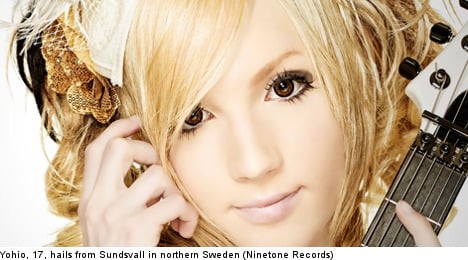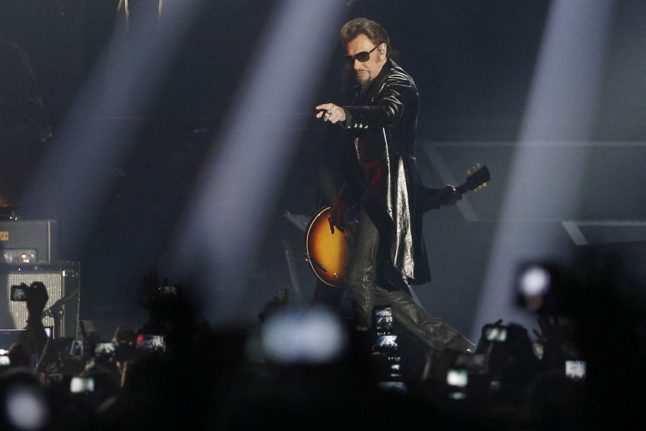Among the artists revealed this week as hopefuls to represent Sweden in the 2013 Eurovision Song Contest, there is one name that stands out.
Yohio.
And while Sweden’s Melodifestivalen is known for attracting unorthodox as well as up-and-coming artists, Yohio’s arrival on the Swedish music scene comes via a path even more unusual than most.
Most Swedes may not have heard of the 17-year-old guitar virtuoso who has been compared by some to Jimi Hendrix.
But it’s hard to blame them for failing to notice that Yohio is already a bona fide superstar, as his rise to fame has taken place on the other side of the globe in Japan.
And for those unfamiliar with the gender-bending fashion trends on the Japanese rock scene, the waifish teen’s feminine outfits can make for a jarring juxtaposition for music fans more used to hearing guitar riffs strummed by macho men in muscle tees, rather than delicate doll-like figures reminiscent of Lolita.
But the self-assured Yohio brushes off any suggestion that his embrace of Japan’s “visual kei” genre means he’s aiming to be a sex symbol.
“Some people may think of it as something sexual, but in Japan where the scene was created, there’s nothing sexual about it,” he tells The Local.
“A guy wearing a dress is not a sexual thing. It’s just a stage show.”
Yohio’s journey from the streets of provincial Sundsvall in northern Sweden to the pulsing stages of Japan started casually when he was a young child with “ninjas and samurais”.
Over time, his interest in Japanese culture evolved into a full-fledged passion fuelled by manga and Japanese anime which took Sweden by storm when he was around ten-years-old.
Video for Yohio’s first single in English, Our Story
A breakthrough moment took place after a friend introduced him to a song by a Japanese band called An Cafe, at the time one of several bands popularizing the “visual kei” genre, and featuring look that cast the gender of the band’s members into question.
“I just looked up the band up and thought, ‘Oh, they’re girls’,” he explains.
“Then I looked at the YouTube comments and realized they were all boys.”
A subset of Japanese rock featuring a sound with echoes of heavy metal and punk, visual kei is perhaps most known for artists that don elaborate make up and costumes, often with a rather androgynous look – something with which the young Yohio could identify.
“Even when I don’t wear makeup, people think I’m a girl and it’s always been like that,” he explains.
“When I discovered visual kei style I was very hooked.”
It didn’t take long for the then 12-year-old Yohio to conclude he was going to be a Japanese pop star, enrolling in night classes to learn the Japanese language and honing his guitar skills in hopes of starting his own visual kei band.
While such a precocious, not to mention unusual, career choice might have caused many parents to worry, Yohio had the good fortune to be born into a family that knew a thing or two about a career in music.
“Music in the blood, I’ve always been around music,” says Yohio, who began learning the piano when he was six and picked up guitar when he was 11.
But the 17-year-old’s music roots are deeper than that.
His grandfather, Jan-Erik “Janne” Rehn, was a member of The Panthers, an influential Swedish pop group that churned out a number of hit singles in the 1960s.
In addition, Yohio’s father Tommy plays guitar in the Swedish metal band Corroded, while also serving as his son’s manager.
So instead of being lectured when by his parents when he had his heart set on becoming big in Japan, Yohio was allowed to pursue his dream.
By the age of 14 he’d started “Sweden’s first” visual kei band, Seremedy, before deciding to embark on a self-organized tour of Japan in the spring of 2011 which included eight concerts.
Seremedy’s tour was so successful the band returned in October for six more dates which would prove pivotal for Yohio’s rise on the Japanese music scene.
“At our final show I finally sung by myself in Japanese. I did it for fun because I wanted to try writing Japanese lyrics,” he recalls.
And representatives from Universal Records in Japan took note, signing Yohio as a solo act shortly upon his return to Sweden at the end of the tour.
While Yohio’s star has been rising over Japan, he has remained relatively below the radar in Sweden, with the possible exception of his small hometown.
“If I walk in the streets, people recognize me, but they don’t care and that’s a good thing. They just leave me alone,” he explains.
Growing up in Sundsvall wasn’t always easy, however, as Yohio recalls being bullied and teased for his early adoption of Japanese fashion trends.
“It can be hard in a small town because people don’t accept that you are different, but I always had my friends,” he explains.
“I knew what I wanted to do so I didn’t care.”
These days, Yohio enjoys being able to spend time relaxing in his home town.
“It’s very calming to be in Sundsvall. It’s fun to go around out in the world and gather inspiration and then go back there and make something of it,” he says.
And with the recent release of his first single in English and his addition to the line-up Melodifestivalen, Yohio hopes he can help open the eyes of Swedish music fans to the visual kei style at a time when most Swedes’ fascination with music from Asia has centered on Korean artists Psy’s YouTube hit Gangnam Style.
“I hate it,” says Yohio.
“I’ve never liked k-pop at all. Most of it is just American crap.”
The young Swede adds that he’s against what he calls a “sexual approach” to pop music stemming from the United States and adopted by many artists in Korea.
“I don’t like Lady Gaga because she’s so sexual,” he snarls.
“I think it destroys our youth. I don’t want my sister growing up to be a slut.”
Yohio rejects any claims that his nubile, effeminate stage persona is in anyway sexual.
“I want people to listen to my music and not to give a damn about how I look,” he explains, arguing, however, that it would be “boring” to forego visual kei’s elaborate costumes.
“They create a wider universe around the songs, but the songs are still important,” he adds.
“I want to make people listen to the music but I don’t want to drop the visual style because that’s what I want to bring to the west.”
And with Melodifestivalen’s publicity train getting set to reach full speed, Yohio hopes being a part of Sweden’s most popular music competition will help him do just that.
David Landes



 Please whitelist us to continue reading.
Please whitelist us to continue reading.
Member comments